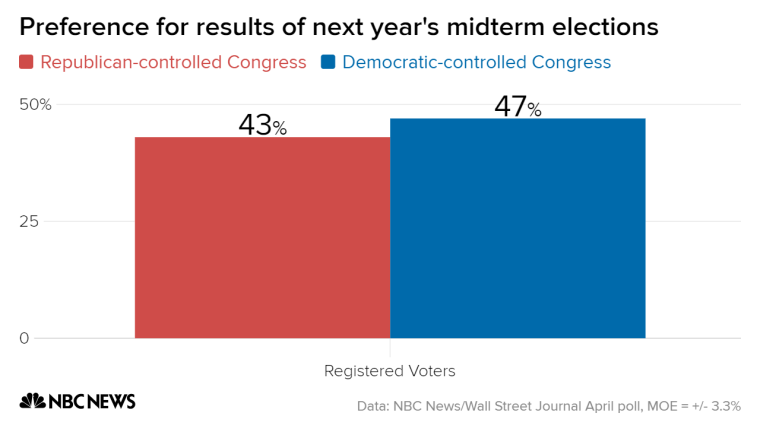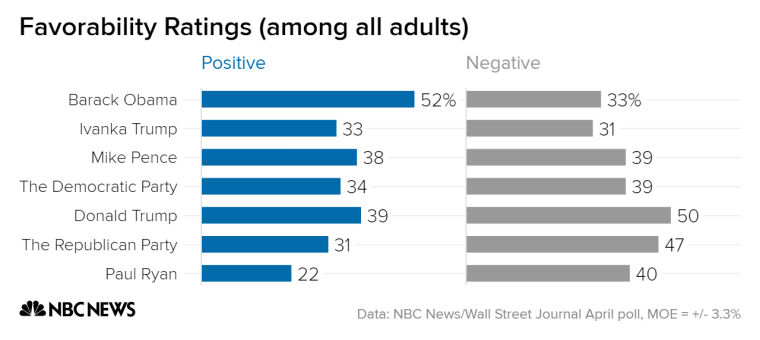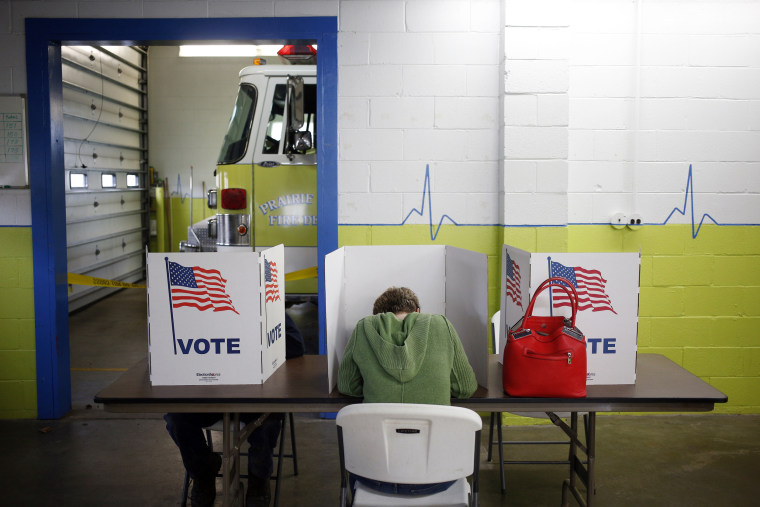Democrats may be feeling vindicated by President Donald Trump’s bumpy first 100 days in office, but they still have work to do if they hope to turn antipathy towards the president into a decisive rebuke of the GOP at the polls in 2018.
A new poll from NBC News and the Wall Street Journal shows that 47 percent of registered voters say they would prefer a Democratic-controlled Congress after the next midterm elections, while 43 percent say they would like to see Republicans in charge. While Democrats have a four-point edge at this very early stage, their advantage still falls short of the double-digit lead they held on the same question shortly before their big electoral victories in 2006 and 2008.

The new survey comes after Democrats were buoyed by stronger-than-expected special election performances in historically red congressional districts in Kansas and Georgia. The party hopes that both races offer early signs of an energized Democratic electorate and a demoralized Republican base.
It’s worth noting that neither special election results nor early measures of congressional preference are consistently accurate predictors of midterm outcomes. In April 2009, Democrats had an advantage of nine points on the question of congressional control but went on to face what then-President Barack Obama called a “shellacking” at the polls the following year.
But the poll also contains other signs that Democrats – and Republicans – still have a lot of image-polishing to do.
Views of the Democratic Party have recovered slightly from a low point in February, when nearly half of Americans viewed it negatively. But the latest survey shows that, while it is still more popular than the GOP, more Americans still view the Democratic Party negatively (39 percent) rather than positively (34 percent). For Republicans, the picture is even more grim at 47 percent negative, 31 percent positive.
What’s more: among independents, both parties get an emphatic thumbs down. Just 19 percent have a positive view of the Democratic Party, while 15 percent say the same of the GOP.
“I’m not sure any of these results make it great to be anything,” said Democratic pollster Fred Yang, who conducted this survey with Republican pollster Bill McInturff. “But I think it’s great right now not to be a Republican.”

Other than Trump’s poor approval ratings, the brightest spot for Democrats may be the continued popularity of their most recent standard-bearer. The poll finds that 52 percent of all Americans give former President Barack Obama a positive rating, while 33 percent view him negatively (+19 points).
That’s compared to 39 percent who view Donald Trump favorably, while 50 percent view him negatively (-11).
Vice President Mike Pence fares better, with 38 percent of Americans expressing a favorable view about him while about the same share — 39 percent — disagree (-1).

And Trump’s daughter Ivanka, who has been frequently been painted in media reports as a moderating influence on the president, is viewed positively by 33 percent of the country, while 31 percent view her negatively (+2). But, while she is not saddled with the same kind of dismal ratings that plague her father, she is still underwater with some of the groups that are most likely to be targeted by her fashion and jewelry brand: women overall (-1), Americans under 35 (-12), urban dwellers (-8) and suburban women (-3).
The biggest loser in the new NBC/WSJ poll may be House Speaker Paul Ryan, who has seen his popularity rating plummet since the collapse of the GOP health care bill to replace Obamacare. In February, Ryan’s popularity rating was 34 percent favorable, 35 percent unfavorable (-1). Now, just 22 percent of Americans say they have a good impression of him, with nearly twice as many – 40 percent – disagreeing (-18).
The most significant cause of Ryan’s drop in goodwill came from within his own party. In February, 61 percent of Republicans reported positive feelings about Ryan, a figure that’s dropped to just 42 percent now.
The NBC/WSJ poll was conducted April 17-20 of 900 adults, including more than 400 who were reached via cell phone. The poll has an overall margin of error of plus-minus 3.3 percentage points.

